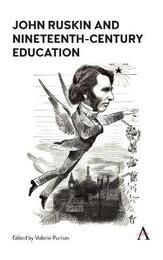
|
John Ruskin and Nineteenth-Century Education
Hardback
Main Details
| Title |
John Ruskin and Nineteenth-Century Education
|
| Authors and Contributors |
Edited by Valerie Purton
|
| Series | Anthem Nineteenth-Century Series |
|---|
| Physical Properties |
| Format:Hardback | | Pages:204 | | Dimensions(mm): Height 229,Width 153 |
|
| ISBN/Barcode |
9781783088058
|
| Classifications | Dewey:370.1 |
|---|
| Audience | | Professional & Vocational | |
|---|
|
Publishing Details |
| Publisher |
Anthem Press
|
| Imprint |
Anthem Press
|
| Publication Date |
14 June 2018 |
| Publication Country |
United Kingdom
|
Description
John Ruskin influenced Mahatma Gandhi, Leo Tolstoy, Marcel Proust and William Morris among others. A great educator, Ruskin is the force behind key debates in education today. The essays in 'John Ruskin and Nineteenth-Century Education' examine Ruskin's influence on educating girls, libraries, creativity, grammar schools, social mobility, the environment and the future of the planet.
Author Biography
Valerie Purton is emerita professor of Victorian literature at Anglia Ruskin University, Cambridge, UK, and has published widely on the Victorians. She is the author of Dickens and the Sentimental Tradition (2012); editor of the Everyman Dombey and Son (1997) and Darwin, Tennyson and Their Readers (2013); and co-author of the Palgrave Literary Dictionary of Tennyson (2010) and Poems by Two Brothers: The Poetry of Tennyson's Father and Uncle (1993). Purton has been editor of the Tennyson Research Bulletin since 2011.
Reviews"A valuable new vantage on Ruskin's contributions to a trans-European conversation among writers, intellectuals, and educational professionals concerning educational philosophy, instruction, school organization, and the social benefits of educational improvements during the nineteenth century. - Sarah Winter, Nineteenth-Century Prose, Vol. 47, No. 1: Spring 2020" As this volume shows, Ruskin's view was that self-fulfilment for everyone was possible. The book also sets out Ruskin's understanding that constraints of conventionality had to be broken fully to achieve the full self-fulfilment of all. - High Hobbs, The Companion, No. 19, 2020, accessed online at https://issuu.com/guildofstgeorge/docs/13_companion_for_pdf_12rd_june
|